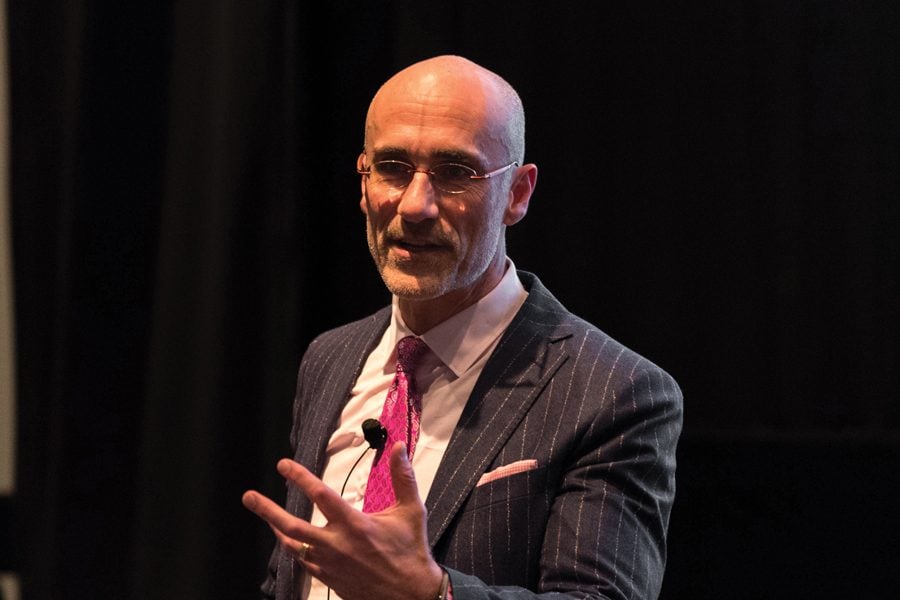Arthur Brooks, president of American Enterprise Institute, urges nation to unite through love
November 8, 2018
Arthur C. Brooks, president of the conservative public policy think tank American Enterprise Institute, doesn’t want everyone to agree with his political views. He wants them to disagree with him.
“Together I think we can be the beginning of a new movement in the country, a movement of unity and of harmony,” Brooks said, speaking to an audience of about 80 students and Evanston community members in the Block Museum of Art auditorium. “Not a new country of agreement, because I don’t think agreement is even good. I believe in disagreement. But I believe we can disagree and do it better.”
Brooks spoke as part of the Institute for Policy Research’s Distinguished Public Policy Lecture series, which brings researchers and professors in the public policy field to speak at the University. Brooks’ lecture, “Reuniting America in a Time of Extreme Polarization,” aimed to teach the audience what they could each do to bring people together.
The biggest problem in American politics — and what has led to the divide today — is not that people can’t agree, Brooks said, but that the culture encourages treating people who disagree with contempt. Brooks said this reduces those with different views, and leads to toxic political discussions.
“That contempt pulls us apart as a nation, and if we want to come back together, even if we think we’re right and they’re really wrong, we’ve got to stop doing that,” Brooks said.
Second-year Kellogg student Steve Merrick told the Daily he was pleasantly surprised by the lecture’s focus on what people can do as individuals to bridge the political gap.
Having come to the event unaware of who Brooks was but curious about the topic of “reuniting America,” Merrick said he expected the event to focus on the bigger picture, but said the individual aspect felt more relatable and made him feel like he learned what was genuinely achievable.
“I came out of the event feeling pretty motivated,” Merrick said.
Brooks also said if people want to come together, they need to reach for higher standards: Rather than than merely tolerating or being civil with people with different political opinions, he said they should treat the opposing side with love.
To provide an example, Brooks reflected on an experience in which he received an email from a man from Dallas who extensively criticized a book he had recently published. Brooks choose to respond by thanking the man for reading his book, as he wasn’t accustomed to people actually reading the work he published prior to criticism.
The man responded with an email inviting Brooks to get dinner if he was ever in the Dallas area.
To close his lecture, Brooks gave the audience three pieces of concrete advice on how to bridge the political divide. Avoid getting riled up or unnecessarily outraged by pundits or public figures, he said, in order to keep a clear mind and remain rational about issues. In addition, intentionally he suggested seeking out conversations with people of differing political opinions, in order to practice responding to contempt with compassion. He last recommended learning how to be genuinely grateful for having political discussions.
“How do you bring America together? You answer contempt with warm-heartedness, no matter how you feel,” Brooks said.
Shirley Adams, who runs a dance studio in Evanston, told the Daily that she came to the event because the American Enterprise Institute is “probably the organization (she) hates most in the world.”
In spite of her established dislike of the organization, however, Adams said she appreciated Brooks’ discussion, and added it took her back to a time when people of different political affiliations could exist together and remain friends. Adams said that — although she sometimes feels that conservatives use religion and the pretense of wanting to be united to mask hateful ideologies — she felt that Brooks was very genuine.
“About 50 years ago, we used to have worthy opponents in politics, where people who disagreed were still in the same legislative house or senate,” she said. “And they talked to each other, they were even friends. They just had different ways of seeking solutions. And (Brooks’ lecture) harkens back to that.”
Email: wilsonchapman2021@u.northwestern.edu
Twitter: @wilsonchapman10



